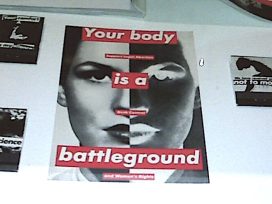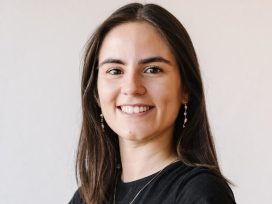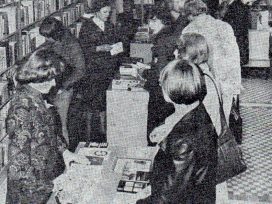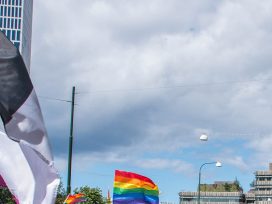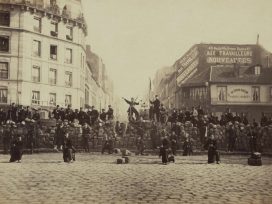Founded in 2014, Gerador houses a print and online magazine dedicated to creative journalism, produces inclusive cultural events in Portugal, and trains upcoming journalists and editors through its bespoke journalism courses. Clara Amante, head of Gerador’s Academy, explores questions of cultural funding and how EU projects are helping Gerador develop their methods of cultural and journalistic engagement.
Priyanka Hutschenreiter (PH): How did Gerador start? What projects have you worked on in the past and what are you focusing on now?
Clara Amante (CA): Gerador started 11 years ago now. It started first as an exclusively cultural project. The main focus, which is still very present until today, was to make culture more accessible to everyone and to bring it away from a place of elitism, and to mix recent emergent artists with more traditional art forms and more classical ones.
We also had the magazine since the beginning, but the first events were very much culturally focused. Then as we grew as an organization, we are a nonprofit, but as we grew, we started expanding our focus while also still maintaining a lot of focus in arts and culture. We also started stepping into questions related to inequality, social justice, issues that affect young people in general because we always had quite a young audience following us as we always paid a lot of attention to design and to communication.
As we grew as an organization, we started focusing on topics like sustainability and we transformed our magazine into more of a journalistic project. So now we publish the magazine in print and on our website. We have an editorial project where we practice slow journalism and it’s through this angle that we are part of the Come Together project.
We also started our own school with different training courses, which is also a way of getting some financial sustainability. It’s not a lot, but it’s something that helps us be less dependent on other sources in order to do our work. We are presenting these three main foci: culture, journalism and education.
As time went on, we also started developing European projects because at first we were very much focused on Portugal-based events and audiences. But we saw an opportunity to grow and to also connect with those organizations with similar mindsets and to learn from them through these projects. That’s how we started getting more involved in projects funded by programs like creative Europe.
Right now, we are working on a range of projects. Within the culture focus, we launched the Uncover festival this year in March, which was about how image shapes our perceptions of reality. It tapped a lot into technology, AI, but also decolonization. The main question we explored was how things are presented to us and how we see them shape our understanding of the world. The festival was received very well so we are already planning the next edition, which is going to be next year.
We also have an event that is going to take place in Portugal towards the end of the year, which is about journalism and copyright regulations for journalists and journals. This will involve a lot of debates with journalists from different fields and different kinds of media. It is founded by a Portuguese organization that is dedicated to protecting journalists’ rights.
Within our European projects, we are still working on the Come Together project, and we have a couple of new projects, one that is also connected to journalism. This is called Geojo and it’s dedicated to producing a new training course for journalists who want to talk about geospatial issues using data and don’t really have the tools to do so. We are working in a partnership with some universities towards a curriculum that can respond to this need. And then we have a couple of other projects that are more connected to artistic and cultural residencies.
We have an interesting project about the construction and deconstruction of colonial narratives called LEAP, which stands for Legacy in Progress, where we’re going to have a lot of talks about the effects of globalization, especially within the cultural sector. It’s also going to tap a lot into the perspectives of young people for new kinds of futures. We are very excited about that.
We are also about to launch a new issue of our magazine, which has as its main topic the 15th anniversary of the legalization of marriage equality in Portugal. It’s about how that law has shaped society in different ways.
PH: Does Gerador focus specifically on Portugal or on Portuguese-speaking areas, so also Brazil and and other areas where Portuguese is also spoken?
CA: I would say it is more focused in the Portuguese context, but we also work a lot with guests, partners or artists from other Portuguese-speaking countries, but who currently live in Portugal. It is quite difficult for us to have that reach, especially because it’s outside of Europe. And there aren’t as many funding mechanisms to support that kind of outreach.
But we do try to incorporate broader perspectives in our work, mostly through people who are migrants in Portugal or descendants of migrants. And we end up touching a lot of topics that connect to other Portuguese speaking countries, but mainly through these people. We naturally work a lot with Brazilian people, because there are a lot of Brazilians from the creative industries that come here, so we end up having a lot of artists from Brazil that we work with.
However, we increasingly strive to work not only on European but also on global themes, as we believe the challenges the world faces are deeply interconnected — and it makes perfect sense to seek solutions together.
PH: You were saying you take part in EU projects to learn or to acquire different kinds of skills or ideas from pan-European partnerships. How do you integrate that knowledge that you get from or develop in your EU projects into your more local locally focused projects?
CA: I think it has been really great for us because we have always been so multidisciplinary that it has been difficult to find a place where we fit neatly within the Portuguese context and it has been very inspiring to understand that there are other organizations out there who are experiencing the same. There are some others in Portugal, but it’s such a small country so there’s not that many.
It has been very useful to incorporate some things that we have seen in other places. A very practical example would be the Uncover Festival. We wanted it to be very participatory, very engaging for the audience and not just a place where you go and listen to someone speak to you. This is a kind of logic that makes a lot of sense to us, but we didn’t always know the best strategies to make this happen.
We went to an event organized under the creativity pioneers fund of the Moleskin Foundation, which is a very interesting project that gathers people from all over the world within the creative sector and the social sector as well. It was super interesting to see how they were organizing their conference, how they were implementing some more innovative methodologies to make us feel like we have agency within a planned program that was presented to us. We also took a lot of ideas from the 2024 Eurozine conference in Warsaw.
These kinds of events have really helped us to shape and understand what we could bring from these initiatives that we are seeing in other places and which are initiated by organizations that have a similar mindset to ours. The question for us is always: how can we take something from here and adapt it to our context?
PH: What is Gerador’s approach to funding right now?
CA: We have always had to be very resourceful and creative when it comes to funding. I think one strategy that has existed since the beginning and that is still going on until today has been to sell ideas to other organizations. For example, we do that a lot with municipalities. So we come up with a concept, like the Uncover festival, that we think is interesting and we want to implement it somewhere. We then propose this to a municipality and they end up buying the festival, which funds the implementation of it and the team that is going to be working on it.
We also provide services to external organizations. For example, there is a project initiated by the Portuguese state, which is essentially a national showcase for young creators. It’s a national initiative to promote the artistic work of young people. Every year there is an open competition and organizations can apply to be the organizer. We have to propose how we’re going to implement it and sell the service. We’ve applied and organised the competition three times in total.
We are sometimes also contacted directly to organize a journalistic or cultural event using our methodologies, with which people are familiar. Besides this, we have the journalism school, which also contributes a little to our sustainability. And now, of course, the European projects also.
This interview was commissioned as part of Come Together, a project leveraging existing wisdom from community media organizations in six different countries to foster innovative approaches in global independent journalism.
